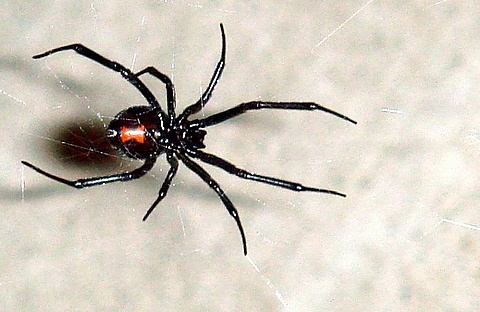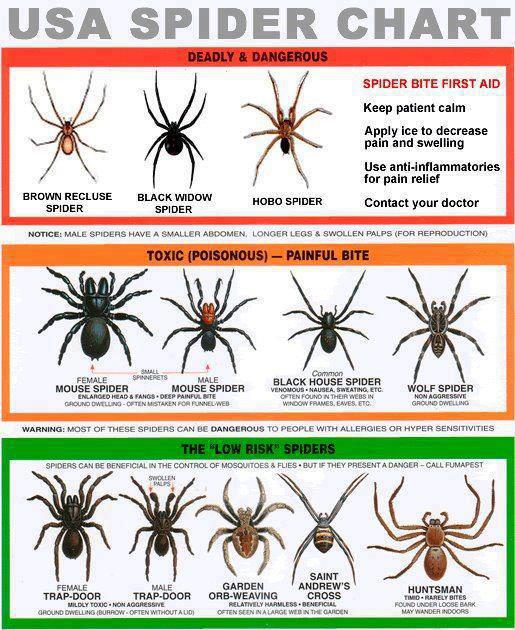Spider Bites in Pets: Black Widows
Share

 It’s that time of year again and with all of the recent weather events we’ve had these days, it’s more important than ever to keep an eye out for spider bites on our pets.
It’s that time of year again and with all of the recent weather events we’ve had these days, it’s more important than ever to keep an eye out for spider bites on our pets.
Spider bites can be very difficult to spot and manage in pets. And unfortunately, pets are also very susceptible to getting bit. Cats in particular can obtain easy access to dark, quiet places that dogs often can’t manage. These are the very places that spiders love to hide.
Unfortunately, cats also have the most intense reactions to these bites. A single bite from a Black Widow can result in death. If you believe your cat (or dog) has been bitten, it’s important to have them treated immediately by a veterinarian.
That said, let’s move on to identifying symptoms of a Black Widow bite and why they are so toxic to our four-legged friends.
[heading style=”1″ color=”#ff9933″ style_color=”#ff9933″]Identification of Black Widow Spiders [/heading]Black Widow spiders are generally about an inch in diameter although they can be smaller or larger. The female (which is also the most poisonous and aggressive) of the species are a very glossy black and have a very distinctive red hourglass pattern on their stomachs as well as a bulbous black abdomen. [heading style=”1″ color=”#ff9933″ style_color=”#ff9933″]Black Widow Habits and Lifestyle[/heading]Black Widows prefer to hide in dark crevices during the day.Most active at night, black widows tend to spin very elaborate, “sticky” webs that appear almost overnight.
They appear most often in the warm climates of the Southwest, but have been found as far north as Canada and as far East as Florida. You will most often find them in dark garages, door frames and any place that is protected from predators and the elements.
While the Black Widow is not typically aggressive, it will bite to protect itself. The female is particularly given to a nasty bite while the males and juveniles are a bit more protective of their venom and generally are not as aggressive.
[heading style=”1″ color=”#ff9933″ style_color=”#ff9933″]The Bite[/heading]The toxin that is found in the Black Widow spider is actually a protein known as α-latrotoxin. This protein works with your pet’s nerve endings to create involuntary muscle contractions, a gradually increasing pain, and may cause elevated blood pressure. [heading style=”1″ color=”#ff9933″ style_color=”#ff9933″]What to Look For[/heading]Neither you nor your pet may realize that they have even been bitten. Black Widow venom can cause very different responses in pets. Some have an almost immediate reaction with localized swelling, other animals don’t show any symptoms until several hours later when the protein reaches their lymph nodes. There may be no swelling or pain at the actual site of the bite. Its believed that the most severe pain will be realized one to three hours after a bite.Look for the following symptoms in your dog:
- Restlessness (your pet may have a difficult time getting comfortable)
- Muscle pain
- Drooling
- Increased heart rate
- Muscle rigidity (particularly in the abdomen)
- Limb weakness
Cats show far more severe signs including:
- Severe pain
- Drooling
- Paralysis
- Death
[heading style=”1″ color=”#ff9933″ style_color=”#ff9933″]Antivenin for Black Widow Spiders [/heading]:
Antivenns are available for Black Widow bites, but are generally not administered due to the extremely high cost. Most vets are unable to keep an antivenon in stock due to a short shelf life. It is likely that if you choose to have this administered, a veterinarian will need to retrieve it from a human emergency facility.
In Cats: Yes! If you suspect your pet has been bitten by a Black Widow, take your pet immediately to the emergency vet. The toxin in Black Widows is particularly deadly to our feline friends and requires immediate treatment.
In Dogs: Contact your vet immediately and discuss options for treatment. If your vet is familiar with your pet, they may ask to see it immediately or they may recommend that you pack the area in ice to reduce inflammation. Only your vet will be able to recommend a course of action.
If you’re in doubt as to what type of spider bit your pet, taking them to the veterinarian is the best action. Meanwhile, here’s a chart that will help you determine the type of spiders your pets are most likely to run into.











